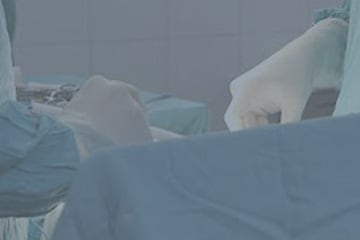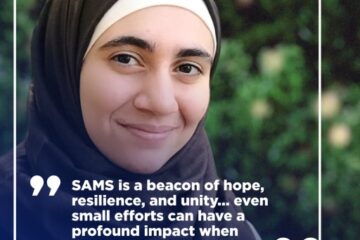November 16, 2016
I’ve recently returned from working with SAMS-Global Response, an NGO that provides medical care to refugees based in the north of Greece near Thessaloniki. We worked in 3 different sites, serving mostly Syrian refugee populations (but also some Iraqis), most of whom had been resettled there after reaching the infamous Idomeni makeshift camp.
Working as a doctor there was similar to clinic work as a GP in the UK. No doubt, we heard some bad stories. We met a man whose house was bombed, causing shrapnel to pierce his skull and rubble from a building to hit him in the abdomen. We met a Syrian surgeon who had operated on both Syrian army and Rebel fighters, before having to flee from ISIS and the conflict. We met people who had suffered the loss or separation from family members. The collective trauma existing in each camp was immense and at times hung heavy in the air.
I was like many of the volunteer doctors, nurses and midwives there who spoke no Arabic, so we had Arabic translators, who helped us interact with our patients. These translators were vital to everything we did, as they translated our medical questions, opinions and plans into Arabic and then back from the patients into English. These translators were young men, all aged between 20 to 25, and were all refugees themselves. Rather than talk about how it was to work as a doctor, I think it’s more interesting and important to talk about these young translators.
Our translator colleagues were the lens through which we learned about the experiences of our patients. As we asked basic and simple medical questions, other information was spoken only in Arabic. When I asked about vomiting, the patient would answer in Arabic, but my translator would rarely translate the part where she mentioned she has had no appetite since she was forcefully separated from her husband 3 months ago. In practice, this meant that they would often hear the traumatic stories of traumatized patients first hand, and then edit what they heard into manageable chunks of purely medical information that we could digest. In doing so, they shielded us (“us” being the Western, non-Arabic speaking doctors) from the worst of what they heard: threats of violence in the camps, emotional trauma, the horrors of war. These are things the translators heard but modified or shortened when relaying them back to us, inadvertently protecting us from the worst of the trauma.
Working with the translators every day, joking with them, enduring some tense moments and stressful patient encounters, we formed a good bond with them, even if some of the volunteers were only there for a few weeks.
Of all the translators, I’d like to focus on three guys in particular. These three guys were also refugees who lived either in camps just like those where our clinics were based, or in other accommodation close by. Writing about them isn’t as straightforward as it might sound. All between the ages of 18 and 25 when they left Syria, they are “of age” for military conscription and for those who have escaped Syria, many are now officially ‘defectors’ from the Syrian Army. They chose to run away rather than being forced to fight and kill for the regime, or for fear of their own death. As a result, their names have been changed. I feel it’s actually more helpful to give them English names so that I’m not referring to them as random case files, but as people whose story is in need of being told. So hopefully this isn’t too cliché, but in this essay they will be known as William, Alex and Harry. I have kept their stories as true to their actual identity as possible, with some small changes to further anonymize them and include the stories of one or two other people I met but who I have not been able to talk about in detail here.
William
Will is the youngest of the 3 translators aged 19 and was the most outgoing of the three by far. He is warm and gregarious in a way that you simply cannot fake. A good-looking guy, what I would describe as “classically handsome” kind of features. The first thing that strikes you about Will is he is almost always smiling. He radiated positivity. At work he was almost unflappable even in some stressful situations, joking with patients and doctors alike, keeping the peace and keeping the clinics flowing smoothly. While he technically had the most limited English, he easily compensated with his confidence and the way he speaks and interacts. This positive attitude in the clinics might sound insignificant, but it is so, so noteworthy. Think of the scenario in which he finds himself waking and up goes to work, aged 19. I think to my own work ethic and professionalism as a 19 year old, which often left a lot to be desired. I would frequently turn up late, sometimes be lazy, sometimes become impatient or lose my cool in the workplace. Will on the other hand has escaped a war zone and is living as a refugee in a makeshift home, away from his family. Being professional and just positive about things, day in day out, without ever letting the strains he must be under get the better of him made a massive impression on me.
Harry
Harry is small in stature, with a kind face and glasses. He is now aged 20. If this were a classroom, you’d probably describe him as one of the geeks. He is a sweet guy, about as inoffensive as it is possible to be. The first thing I noted about Harry is that he really cared about his English. While all of the translators were always eager to improve their English and learn new words, Harry seemed to have a passion for language and English in particular. He then explained that back in Syria he was planning to study English literature and possibly also study French. One afternoon when the clinic was relatively quiet, we had an interesting discussion about language, as the English doctors and Syrian refugees taught each other words and phrases in their respective languages that we thought particularly interesting, or funny, or cool. We laughed at each other’s pronunciations. He then decided to play me his collection of Eminem on his phone, and we talked about our favourite Eminem albums, before both reciting the lyrics to “Lose Yourself” by Eminem, a song whose lyrics are burned into the mind of every young person in the world who came across it in the film 8 Mile.
Alex
Alex is taller, has sharp features, was smart and was loved by all the doctors. He had a confidence and self-assuredness about his use of English that few of the other volunteers had. He told me that back in Syria he was studying biochemical engineering. He was in his 3rd year of university when he had to flee the country. I remember my 3rd year of uni. It was stressful at times, and I certainly didn’t have to deal with existential questions like will I die if I stay to complete my degree and will my university even exist in a year or will it be bombed. I remember one exchange with Alex where we were in clinic and I couldn’t get a syringe to suck fluid from a bottle. He looked at me like I was an idiot and explained it was because there wasn’t enough air in the container I was using, saying “its physics, duhh!” He proceeded to try and failed as I had. After a few more attempts, we both realised there was a tiny cap was still on the syringe. I laughed and pointed the syringe at him saying, “Ohh, it’s physics right??” and we all laughed. Moments like this are when you realise quite how random life is, that he finds himself living in a refugee camp while I don’t.
Alex had twice attempted to fly to Switzerland using a fake passport and twice failed. He paid hundreds of dollars and prepared for months. The second time he described his experience as utterly heartbreaking after all the effort and preparation he had put in. The plane was on the runway and ready to take off when he was caught. Security came on board the plane and asked him to leave the flight. He was so frustrated and hopeless at this point that his mischievous side took over, and he wanted to scare off those around him. So he shouted deliberately, “allah hu akbar!!” as loud as he could and made himself seem like a radical Islamist, a threat, to provoke and terrify the other passengers.
In the downtime, we often hung out with the translators. It made sense to have these guys with us, as they had worked at least as hard and were part of the team. Initially I noted it was “cool” of us to socialize with them, but soon I stopped noticing it. They were part of the team, of course they should be here. But there was a painful duality to their lives, which was highlighted at the end of the day when we left the camps and they remained. They were sleeping in a refugee camp while we returned to our simple but clean, pleasant accommodation, able to travel around the country and the world using our passports, as we were “legitimate” citizens of the world – a status they had arbitrarily lost and were yet to regain.
For the refugees I treated and worked with, Greece may not be the final stop on their journey depending on when they arrived in Greece. Those most likely to leave are those who have family who have already made it to another European country, who are eligible for relocation under a ‘family reunification’ program. For others, they are no longer able to apply for asylum in another European country. This process is facilitated by the UNHCR and by the Greek government, which due to austerity measures, lacks the resources to increase the speed or volume of processing cases. For those who applied for asylum in another country while they remain in Greece, there is a system of two interviews, each one assessing the candidates’ suitability, any special circumstances & other factors to consider before they are assigned a country of permanent resettlement. These interviews typically occur 6 months apart, leaving the refugees waiting months just to find out the date of their next interview. Mostly however they just wait, and wait. Refugees are unsure of how to best present themselves for these interviews – Do they play up any health issues they have or hide them, selling themselves as fit, healthy workers able to contribute economically. For those refugees granted asylum status in Greece, they could move on to another place in the EU. However, that would mean surrendering free housing, education, medical care and more. There are no easy decisions for those who find themselves as refugees.



